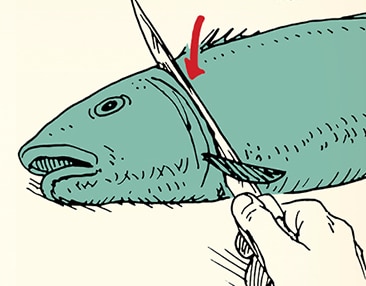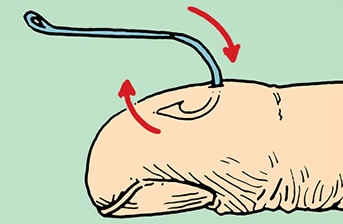
A young guy is the big man on campus at his high school. He’s captain of the varsity football team. Student body president. Homecoming king. Honor society. Valedictorian.
Thanks to his stellar high school career, he gets accepted to a prestigious Ivy League university. But instead of continuing his string of teenage successes, our promising young man flounders. He flunks a class. He gains 20 pounds. He makes few friends. He sinks into a depression. At the end of the year, he returns home with his tail between his legs, feeling like a failure.
What happened?
There’s a well-vetted psycho-social phenomenon that explains this narrative arc.
It’s called the Big Fish, Little Pond Effect (BFLPE), and understanding it can help you better position yourself (and your kids) for success.
We Are Status-Seeking Animals
To understand the Big Fish, Little Pond Effect, you must first understand that we are status-seeking animals. It’s one of our primary drives, along with the drive for food, safety, and sex.
The reason we have a drive for social status is because it contributes to our survival and mating success. Higher-status animals (including the human animal) have more access to resources and mates.
How we perceive ourselves in a social hierarchy contributes to how much drive and motivation we have. When we feel like we have high status, feel-good chemicals like testosterone, serotonin, and dopamine are released, which nudge us to do more of the things that raise and maintain our status. When we feel like we have low status, our brains release cortisol, leaving us feeling stressed and wanting to stay in our bedroom all day, not doing anything. This is an important point when it comes to understanding the Big Fish, Little Pond Effect!
An important fact about status is that it’s relative. There’s no such thing as absolute status. We judge our ranking in the status hierarchy by comparing ourselves to others in our immediate social groups. We don’t care how we fare compared to people living in another country or in entirely different socioeconomic strata. We care about our position relative to our friends, co-workers, and close competitors because how our peers are doing is more relevant to our personal success and flourishing.
So, how do we figure out our status in a particular group? Our brain has a sociometer called the medial prefrontal cortex (MPFC) that’s constantly sussing out our position in the status hierarchy of whatever social group we find ourselves in. Not only does the MPFC make on-the-fly calculations of our current social status, but it also predicts how certain actions will affect our standing.
What’s interesting about the MPFC is that it reacts more strongly to actions that would likely decrease our status than it does to actions that would increase it. Our brain is much more sensitive to status defeats than to status successes. We feel worse when we experience low status than we feel good when we experience high status.
The Big Fish, Little Pond Effect
Now that we understand that our brain is keyed into social status and influences our drive and motivation, we can understand the Big Fish, Little Pond Effect and why our imaginary young man of promise floundered when he went to the big league school.
In 1984, social psychologist Herbert Marsh published a paper that introduced the Big Fish, Little Pond Effect in regard to academic self-concept. Academic self-concept is a student’s self-perception of their ability to perform in school. Students with high academic self-concept do better in school because they feel motivated and capable of learning. In contrast, students with low academic self-concept do worse because they don’t think they’re capable of learning and lose motivation.
Marsh’s research found that a significant factor contributing to students’ academic self-concept is how they compare themselves to other students in their school or class. High-achieving students in a low-achieving school (big fish, little pond) have a greater academic self-concept and do better than equally talented students in a high-achieving school (little fish, big pond).
(Keep in mind that the words “big” and “little” describing a pond refer to the quality/density of competition in an environment, not necessarily to the literal size of the environment.)
In other words, a student’s success could be significantly different, depending on whether they attended a higher- or lower-achieving school, even though their academic ability would be the same in either “pond.”
You can take a student who scored high on the SAT and place them in a school with lots of equally or slightly smarter kids, and that high SAT-scoring student may flounder because he thinks the other students are way smarter than he is. His raw intelligence has stayed the same, but thanks to that perceived status defeat, he loses motivation to keep pushing himself and may take less challenging classes or see his grades fall off.
Subsequent research has confirmed the Big Fish, Little Pond Effect. It cuts across academic disciplines, countries, genders, and income levels.
In his book David and Goliath, Malcolm Gladwell wrote about the Big Fish, Little Pond Effect. He highlighted research that most students who excel in their small-pond high schools would probably be better off attending a small-pond university with less prestige than a big-pond Ivy League school. Going to an elite university will likely diminish their academic self-concept (i.e., status), diminishing their motivation in turn.
Implications of the Big Fish, Little Pond Effect
Knowing that how we judge ourselves against our peers can influence our motivation and drive should provide us fodder on how we can set up ourselves and our kids for success.
If you want your kid to thrive in sports and academics, it may pay for them to be the big fish in a little pond. Having a high concept of their ability relative to their peers can keep them motivated to continue playing a sport or pursuing a difficult academic subject. The longer they stick with a sport or subject, the more likely they are to improve in it. Also, they’ll just enjoy the subject/activity more, which should be the big aim of both school and sports: learning and playing for the sake of learning and playing. With that latter bit, one of the most important things in childhood is simply to develop a physical identity.
So, if your kid is just an average basketball player, it may be good for them to stick with recreational leagues or play for smaller schools. If you throw them on a high-performance AAU team (little fish, big pond), they’re likely to get demoralized and want to quit.
If you’ve got a high schooler who’s thrived and been accepted to many colleges, including Ivy League universities, you might want to encourage them to attend one of the less prestigious schools. They may be more likely to thrive in a small-pond state school than a big-pond Ivy League school.
The Big Fish, Little Pond Effect likely carries over to our careers. As you navigate your career, think about the size of the pond you’re swimming in. If you feel like a big fish in a little pond, you’re likely to have a higher self-concept and, consequently, more motivation than you would if you were a little fish in a big pond.
What’s more, thinking about the size of your career ponds can help you determine where there are opportunities for growth due to a lack of competition. For example, I know a videographer who lived in Los Angeles and had to compete against a ton of other very talented videographers there (little fish in a big pond). He found more success by moving to Oklahoma City, where he’s now a big fish in a little pond.
While it’s generally better for performance to be a big fish in a little pond, for some individuals, being a little fish in a big pond can provide opportunities for growth and development. For these individuals, being the worst in a group doesn’t demoralize them; instead, it motivates them.
So, what kind of people benefit from being a little fish in a big pond? Individuals with a high sense of agency, a high sense of self-concept, and lower trait neuroticism tend to do better as little fish in big ponds.
So, if you’re a hard-charging, type-A personality who thinks highly of himself, you might benefit from looking for opportunities to be a small potato in a sea of big cheeses.
If that’s not you, try to be a big fish in a little pond; generally, it pays to put yourself in a place where you’re higher on the totem pole, and you feel that you have a superior set of strengths that are valued and/or in demand.







